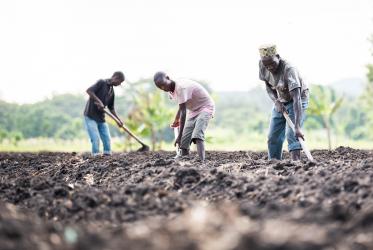*By Fredrick Nzwili
The Global Day of Prayer to End Famine has found relevance in Africa, where communities bear the brunt of severe food shortages associated with the challenge.
On 10 June, the World Council of Churches (WCC), All Africa Conference of Churches (AACC) and World Evangelical Alliance (WEA) called on churches to pray for millions of people at risk and those who face severe hunger.
In recent years, global efforts to tame the phenomenon have also been accelerated, but still in 2018, millions of people in Africa are still at risk.
Last year, an estimated 20 million people in Yemen, Somali, South Sudan and Nigeria were declared on the verge of famine. Conflicts have cut off access to water and food, as millions sought refuge in neighbouring countries.
Like other nations, the affected communities have found help at the churches and mosques’ doorsteps or through faith-based organisations responding to the problem within the communities.
“Divine interventions open doors for other interventions, such as finances. However, we need to pray and act,” said Bishop Zachariah Kahuthu, presiding bishop of the Kenya Evangelical Lutheran Church. His church was one of those listed as a participant in the Global Day of Prayer to End Famine.
“We have a bumper harvest this season in regions where we have churches. I hope the people can be reminded to store food until the next drought or famine strikes,” said Kahuthu.
Eastern Africa has frequently stood on verge of famine due to droughts that wipe out crops, dry up water sources and decimate livestock, leaving the people needing relief aid.
“When a hungry neighbour comes to your house, you cannot ask him to leave after prayers. You must give him or her something to eat,” said Rev. Stephen Lenku Tipatet from the Presbyterian Outreach Mission Church in Kajiado, a southern region in Kenya.
“That’s why we are stressing action that moves the people towards food security.”
His region - the homeland of the Maasai pastoralist community - is emerging from a severe drought that wiped out livestock from most homesteads.
On the Global Day of Prayer to End Famine, Muinde Munyao, a small-scale farmer in Machakos County, highlighted erratic and unpredictable rainfall, poor farming methods and lack of quality seeds as some factors that contribute to hunger.
“Most of the people in this region are small-scale farmers. They do not have the income to purchase quality seeds. When they plant poor seeds, they also get a poor harvest,” said Munyao, a local African Inland Church elder.
“Our farms are also ancestral lands which have been farmed over and over again. For a better harvest, they would need fertilisers, which most farmers cannot afford,” he added.
Farmers in the area have been beating hunger by creating small ponds in which they store water for irrigation if rains fail.
WCC promotes Global Day of Prayer to End Famine (WCC press release of 6 June 2018)
WCC calls for Global Day of Prayer to End Famine (WCC press release of 31 May 2018)
WCC-EAA Food for Life campaign
*Fredrick Nzwili is a freelance journalist based in Nairobi, Kenya







